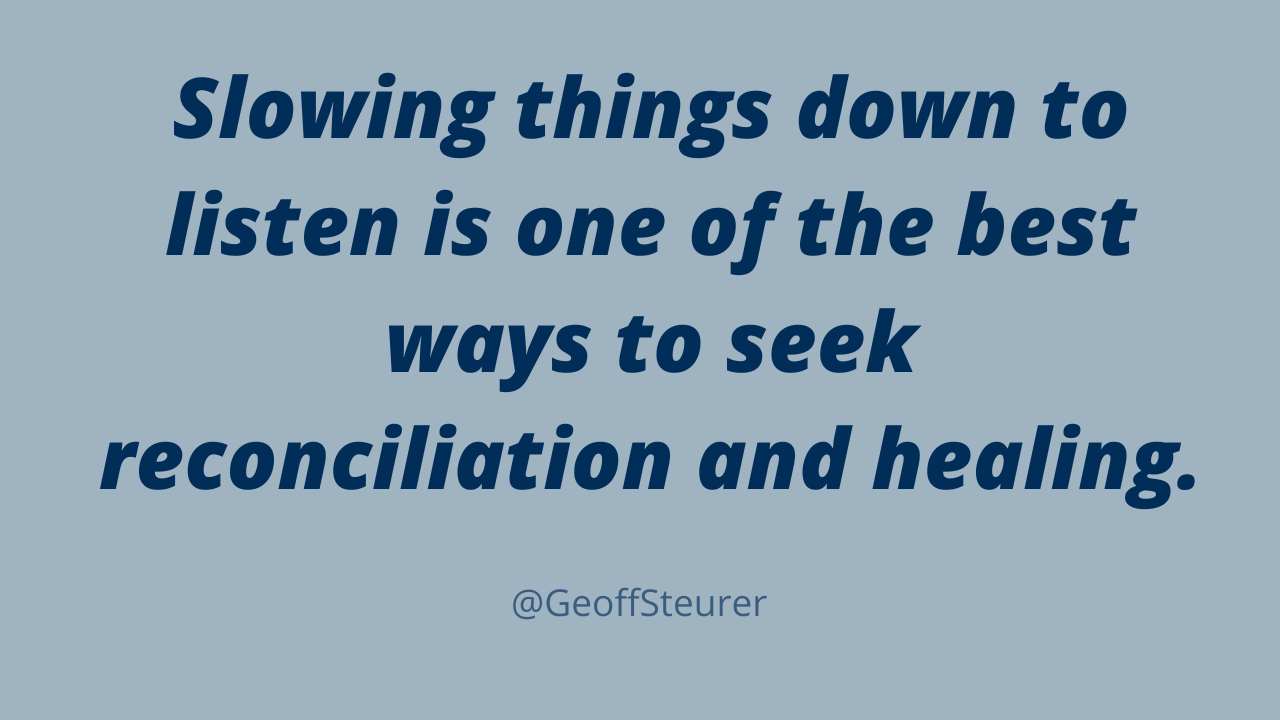
Q&A with Geoff: How Do I Respond to My Sister’s Accusations of Abuse?
Question
I have recently been knocked sideways by an unexpected interaction with my much younger sister that has caused me great distress and left me floundering. I received a text message from her alerting me to the fact that her marriage of 30-plus years was over and that she’d like me to call her, which I promptly did.
After a short conversation, the tone and direction of the call suddenly took a nosedive. She began telling me that I had never cared about her, never loved her and that I never believed her when she told me of the abuse she suffered as a child. She also said I was not innocent in the bad things that had happened to her in her life and that I should not deny my part in causing her pain and suffering. I was dumbfounded!
Among the now free-flowing tears, I assumed that she was in deep pain because of her marriage breakdown and was simply lashing out at me. I was, however, deeply hurt by her accusations, and am now questioning my recollection of things and if I am the person I thought I was.
She later messaged to say that other issues would have to be addressed and until I acknowledged and accepted everything she had said, our relationship could not progress.
I love my little sister and want to be there for her, but I don’t want to cause her or me any further pain during this obviously very difficult time. What then would be the best approach to healing this now-fractured relationship?
Answer
I can only imagine the emotional whiplash you’ve experienced as you simultaneously opened your heart to her tragic story while also retracing your own steps in your family of origin. It can be very disorienting to have someone accuse us of things that don’t line up with our recollection. Relationships, particularly those rooted in family ties, can be intricate webs of memories, experiences, and emotions. There is a lot of pain in this story that requires more time, space, and compassion. Instead of getting reactive, let’s talk about how you can respond.
Confrontations like these can make us question our memories, our intentions, and even our identities. It’s human to experience doubt, especially when someone we deeply care about questions our past actions or intentions. In the face of such accusations, it’s tempting to either defend oneself vehemently or accept blame without reflection. However, the path to healing requires patience, introspection and dialogue.
Listening with an open heart is paramount. While the manner she chose to convey them might have been unexpected and even hurtful, they likely stem from deep-rooted emotions. The first step toward healing is often understanding.
While it’s crucial to empathize with her, it’s equally essential to maintain your own clarity. Personal memories and perspectives can differ, even among siblings. Seeking counseling or conversing with trusted individuals might help you navigate your emotions and gain a balanced viewpoint of past events.
Unfortunately, our memories can become clouded and distorted over time, which makes conversations like these even more difficult. It’s one thing to have fuzzy memories about something of little consequence. It’s an entirely different thing when someone’s memories involve accusations of abuse.
Conversations like these have the potential for derailment, so please consider seeking external support. Engaging a family therapist could provide much-needed structure and support.
Before meeting with her, taking a step back and allowing both of you some space may be beneficial. While immediate resolution seems ideal, emotions are running high, and it might be challenging to find common ground. During this time, it might be helpful for you to reflect, perhaps with the guidance of a therapist or a trusted confidante, on the memories and events your sister recounted.
This process isn’t about assigning blame but understanding different perspectives. You can let your sister know that she’s important to you and that you want to take her experiences seriously. You can let her know you’re taking time and space to sort through these difficult accusations.
After a period of reflection, approach your sister with an open heart. The intent should be one of understanding, not defense. This doesn’t mean accepting blame without discernment, but genuinely trying to understand her perspective and expressing your feelings and memories. I don’t know how open she’ll be to your experiences, but slowing things down to listen is one of the best ways to seek reconciliation and healing.
Approaching the conversation with humility while emphasizing your love and longing for mutual understanding can be more productive than adopting a defensive stance.
This may require multiple conversations and attempts to find healing. It’s okay to space out these conversations if there’s no progress so you can keep your emotional balance. Regardless of the outcome of these attempts, do everything you can to have compassion for her.
This doesn’t mean you have to agree to something that isn’t true. It doesn’t mean it’s your job to keep the peace at the expense of your mental and physical health. Instead, having compassion means you are willing to hold space for all of the things you can’t comprehend about your sister’s situation.



